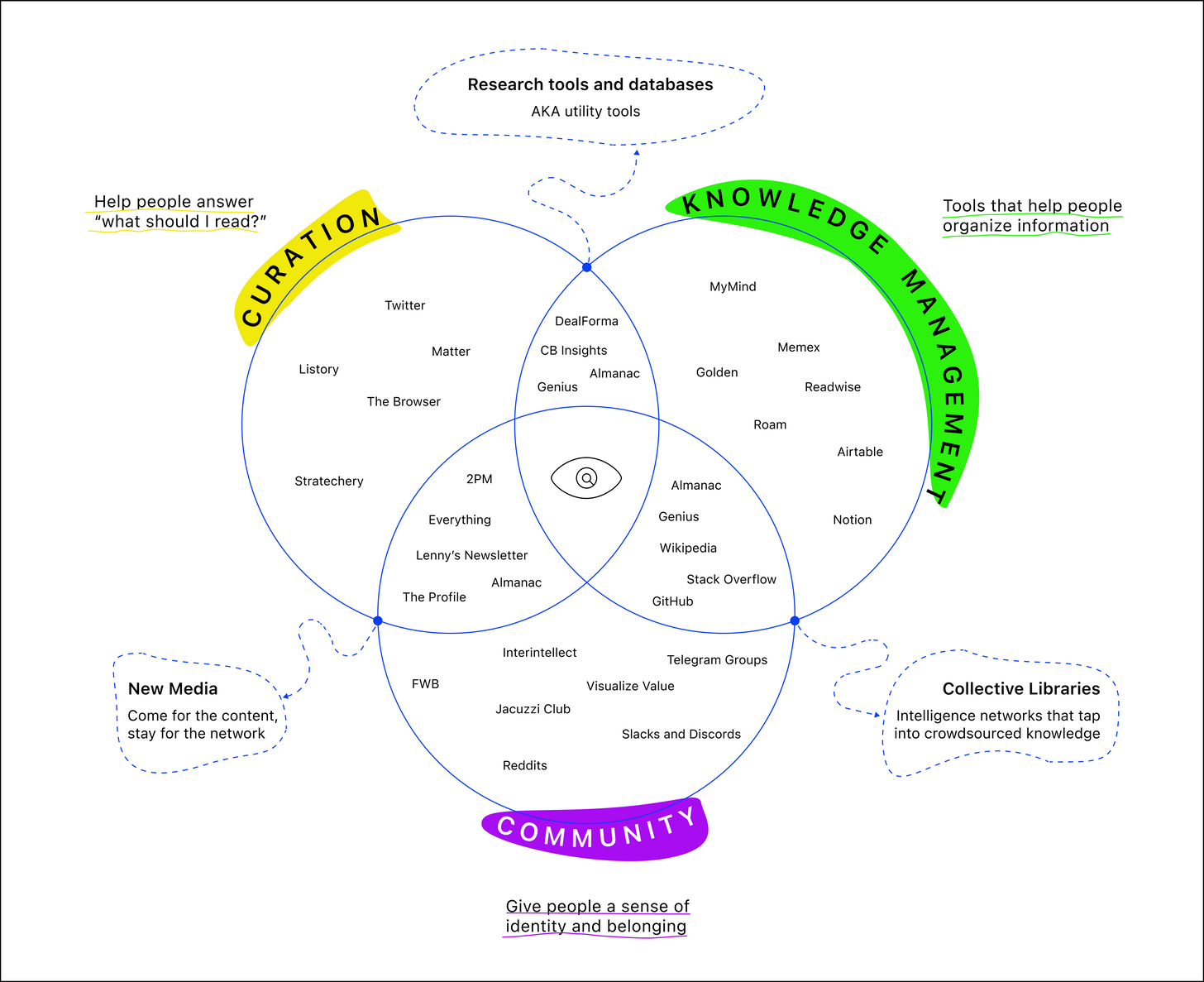Check Your Pulse - Literature Notes
# Notes
#literaturenotes See Sources/Check Your Pulse - Newsletter
# #55: Community-curated Knowledge Networks
#community #social #people #technology
- Potential category: ==online communities at the intersection of content curation and knowledge management. == Knowledge organization is an untapped market.
There’s a whole economy around knowledge organization available for the taking.
- Our brains are not equipped to deal with the abundance of the Internet.
While this presents enormous opportunities, our brains are not equipped to deal with this abundance.
- Discussion about “curation” is too focused on ==content==, and not enough on ==structure.==
- E.G. “What should I read” v.s. “How do we collect, store, and contextualize the information we consume?”
- We need to remember that we’re aiming to think better, not consume more information. Quality over quantity.
the conversation around “curation” has been too focused on the content – “what should I read?” – and not enough on the structure – “how do we collect, store, and contextualize the information we consume?” We seem to have forgotten that the goal is not to consume more information. The goal is to think better, so we can achieve our goals.
- 1. Our feed-based information architecture is obsessed with the present
- Right now, the formats curators use is subject to ==ephmerality,== the property also affecting social media.
- Chronological feeds have rewired our brains.
- ==Everything is fleeting in the feed.== This means you’re either on, always connected, or off and feeling FOMO.
- Related notes:
- Digital architecture has turned us into ==obsessive documenters/consumers of the present.== However, we remain ==indifferent to the archives== we leave behind.
We seem to have accepted the job of the curator as providing a list of links with some commentary on an organized schedule. But this format is subject to the same accidental property of social media; ephemerality. What’s amazing is how chronological feeds — essentially accidental experiments of digital architecture — have rewired our brains. In the feed, everything is fleeting. This design property means you’re either always on and connected, or you’re off and wondering if you’re missing something important. In short, the architecture of digital platforms has made us obsessive documenters and consumers of the present, yet largely indifferent to the archives we create.
- 2. We consume information recreationally, not as a way to achieve our goals.
- Digital architecture makes us consume information that’s present, and ==not necessarily relevant.==
- This promotes ==distracted thinking== and ==superficial learning.==
- The human brain is amazing at ==making meaning==, but deficient at ==long-term memory storage.==
- What’ the point of absorbing knowledge if we can’t apply it to problems we come across?
- Current tools leave the ==burden of memory== to the individual.
The architecture of digital platforms encourage us to consume information because it’s in front of us, not because it’s relevant. It’s an environment that promotes distracted thinking and superficial learning. The human brain is incredible at uncovering meaning, but is deficient at long-term memory storage. If we forget what we read, we can’t apply the knowledge to the problem at hand. With our current tools, the burden of memory is left to the individual.
- 3. Curation has been too focused on the information and not enough on the architecture; how we collect, store, augment, and utilize what’s already in our minds.
- Discussion around curation has focused too much on ==information reduction==, and too little on other ==possible architectures we can explore== (outside of feeds & newsletters).
- Despite technology’s disruptions, content consumption is mostly unchanged.
- Basically, we’ve moved the words from the page to the screen.
- Related:
The conversation around curation thus far has focused too much on reducing the amount of information, and too little on what other architectures might be possible outside of the feeds or newsletters we’ve grown accustomed to. While technology successfully disrupted content production, the experience of consuming content remains unchanged – the words have merely moved from a printed page to a screen.
- Thanks to the Internet, we now have the opportunity to introduce new types of ==digital architecture==. These will help us understand the world by adding ==context and relation.==
- This especially lies in ==community-curated knowledge networks==. Why they can work:
- paid communities are feasible
- there’s renewed interest in curation
- we’re slowly moving away from big social
- we better understand how to incentivize platforms
- This especially lies in ==community-curated knowledge networks==. Why they can work:


The Internet offers us the first major opportunity to introduce new, digitally-native information architectures that improve our understanding of the world through added context and relation. The potential to build community-curated knowledge networks remains largely untapped. There are reasons to be optimistic; the economic feasibility of paid communities, a renewed interest in curation, a slow move away from big social, and an improved understanding of platform incentives. All combined, this will lead to communities that are more sustainable, aligned, and intentional